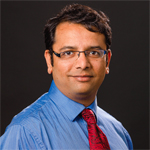“I was interested in the physiology of lupus and being able to help my family,” she says.
Two decades later, she’s doing just that. Dr. Blazer earned her medical degree at Baylor College of Medicine in Houston. She completed an internal medicine residency at Vanderbilt University Medical Center in Nashville and did her fellowship at New York University Langone Medical Center.
Her areas of interest are ethnically determined predictors of disease severity, particularly in systemic lupus erythematosus (SLE). She is a member of the Lupus Nephritis Trials Network and her work with Apolipoprotein 1 (APOL1) in African populations has taken her to Ghana, where survival rates are much worse than in the U.S.
Q: You wanted to be a doctor as a kid to help your family. What sustained that passion?
A: The human is fascinating. Physiology is fascinating, immunology is fascinating. The thirst of knowledge and being able to learn those things—and being privileged enough to have the opportunities to learn—were definitely sustaining. Apart from that, taking care of patients is very gratifying. I get to do something I love every day.
Q: What is it about research that appeals to you vs. clinical work?
A: This came from wanting to learn about lupus as it affects people of African ancestry. My cousins who have lupus have been sicker than some of the patients of other heritages that I’ve met. So I just always wondered why that was. What were the biologic causes of those disparities? For a long time in medicine, I’d just hear, ‘There are socioeconomic differences or there are differences in lifestyles or practices or access to care.’ It just didn’t seem like that fully captured the reasons for health disparities.
Q: What is the dream discovery for you as a researcher?
A: Right now, I’m working with APOL1 and my hypothesis is that this gene is expressed more or not depending on the environment…my dream discovery would be to determine what drives this expression in lupus and how we can turn it off. So that this excess risk related to these polymorphisms becomes obsolete.
 Abhijeet Danve, MBBS, MD, Yale University, New Haven, Conn.
Abhijeet Danve, MBBS, MD, Yale University, New Haven, Conn.
Background: Dr. Danve, who studied internal medicine in India before coming to the United States in 2009, says he was a “confident clinician” caring for about 50 patients a day in Mumbai.
He was always enticed by the pathophysiology of inflammation, immunological response and its correlation with clinical manifestations of various rheumatic diseases. So he came to the U.S. to pursue his interest in rheumatology, completed his residency at New York Medical College and followed up with a clinical fellowship in Rheumatology at Oregon Health & Science University.



